“YOU CAN READ THEM.”
-Our Lady of Medjugorje, 1982-1983
Words From Heaven
Over the years, Our Lady has asked us to do many things and guided us step by step in our walk of conversion through Her Medjugorje messages. She even tells us what to read. Our Lady has specifically stated three things for us to read:
- The Bible:
“Dear children! Put Sacred Scripture in a visible place in your family and read it…” January 25, 2007
2. Her Messages:
“…Therefore, little children, read every day the messages I gave you and transform them into life…” December 25, 1989
3. The book, The Poem of the Man-God, by Maria Valtorta:
1982-1983
Medjugorje visionary Marija (Pavlovic) Lunetti went before Our Lady on behalf of a seminarian and asked the question: “Was it okay to read the book The Poem of the Man-God?” Marija relayed that Our Lady affirmed it was okay by answering:
“You can read them.”1
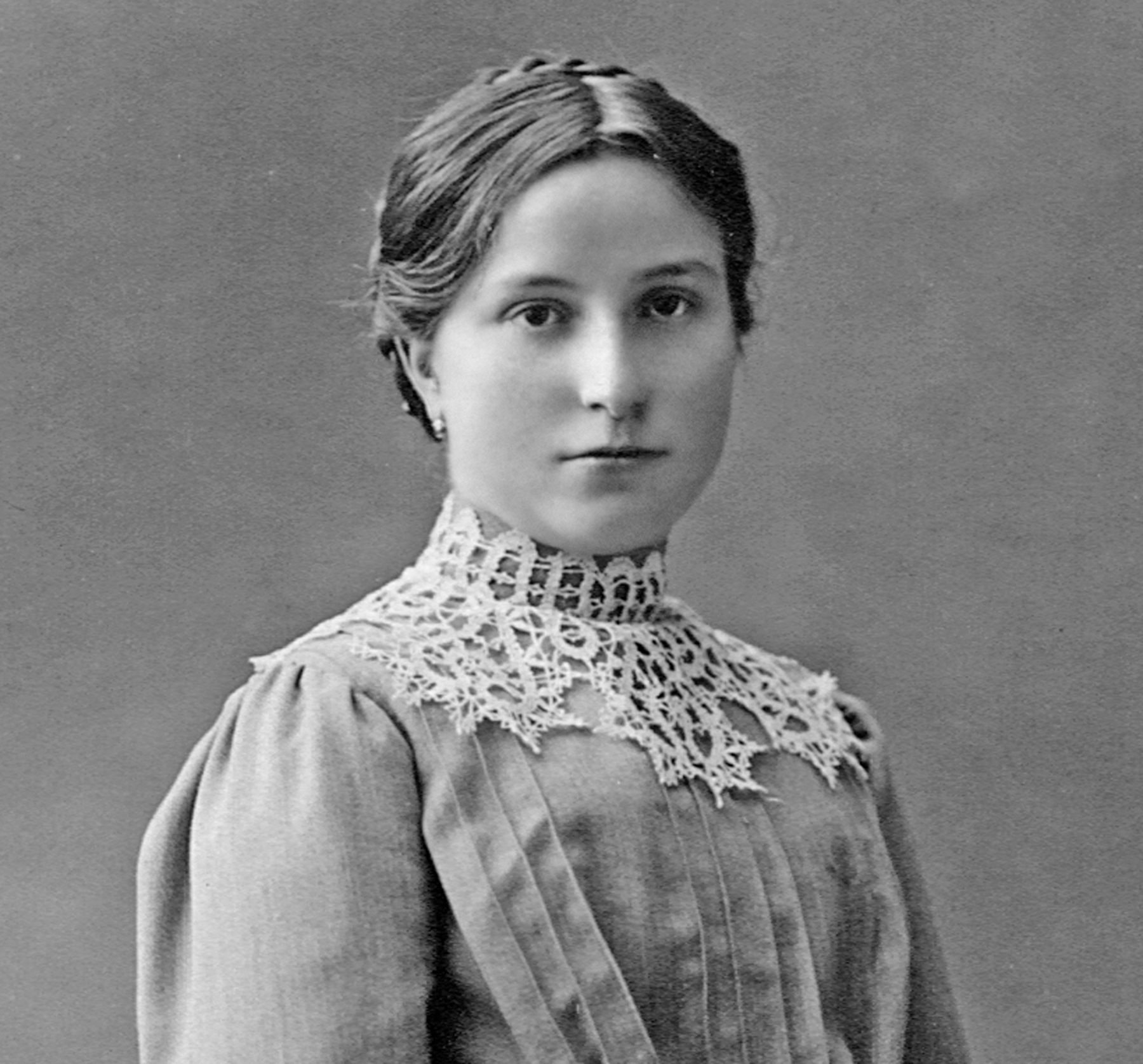
The Poem of the Man-God was little known by the general public before the apparitions of Medjugorje began. The above message from Our Lady regarding the books caused popularity to soar, and the English version of the books began being published in the late eighties. For those who began to read them, there was an immediate impact on their spiritual lives and the level of commitment souls were willing to go in seeking Christ. The spiritual direction these books gave to man was tremendous. They immediately began to bring in a rich harvest for Heaven. A Friend of Medjugorje, founder of Caritas of Birmingham, spoke of and promoted everywhere that people should read The Poem of the Man-God. Caritas of Birmingham became the largest distributor of The Poem of the Man-God in the United States. Resistance by many existed in the beginning. In very short order, the level of resistance rose to a fevered pitch after Caritas began distributing the books in their Mission House in Medjugorje.
Many people are divided about Medjugorje over the issue of The Poem of the Man-God. A Friend of Medjugorje, a solid, true believer in the apparitions of Medjugorje, promoted that if Our Lady gave a message saying to read the books, then Her words were enough, and his position would not waver. But there was a larger threat taking place that few recognized in their battle over the The Poem of the Man-God. It was an indirect attack on Medjugorje. Our Lady said on June 25, 1991:
“…There are many people who do not desire to understand my messages and to accept with seriousness what I am saying…”
There were those involved with Medjugorje who were against the books, yet, they also professed belief in Our Lady’s apparitions, all the while they didn’t accept and take seriously Our Lady’s words to read them. Many became confused and angry. The direct and indirect attack was because it was Our Lady Who had encouraged the reading of these books, and if satan was successful in destroying the credibility of The Poem of the Man-God, his next step, which was his main target, was to discredit the apparitions of Medjugorje. In this way, Medjugorje was on the line because, if the books were condemned as many said they were, the verdict would be that Our Lady said to read a condemned book.
And so in July 1992, Caritas’ founder wrote to Cardinal Joseph Ratzinger, the head of the Congregation for the Doctrine of the Faith, under Pope John Paul II.
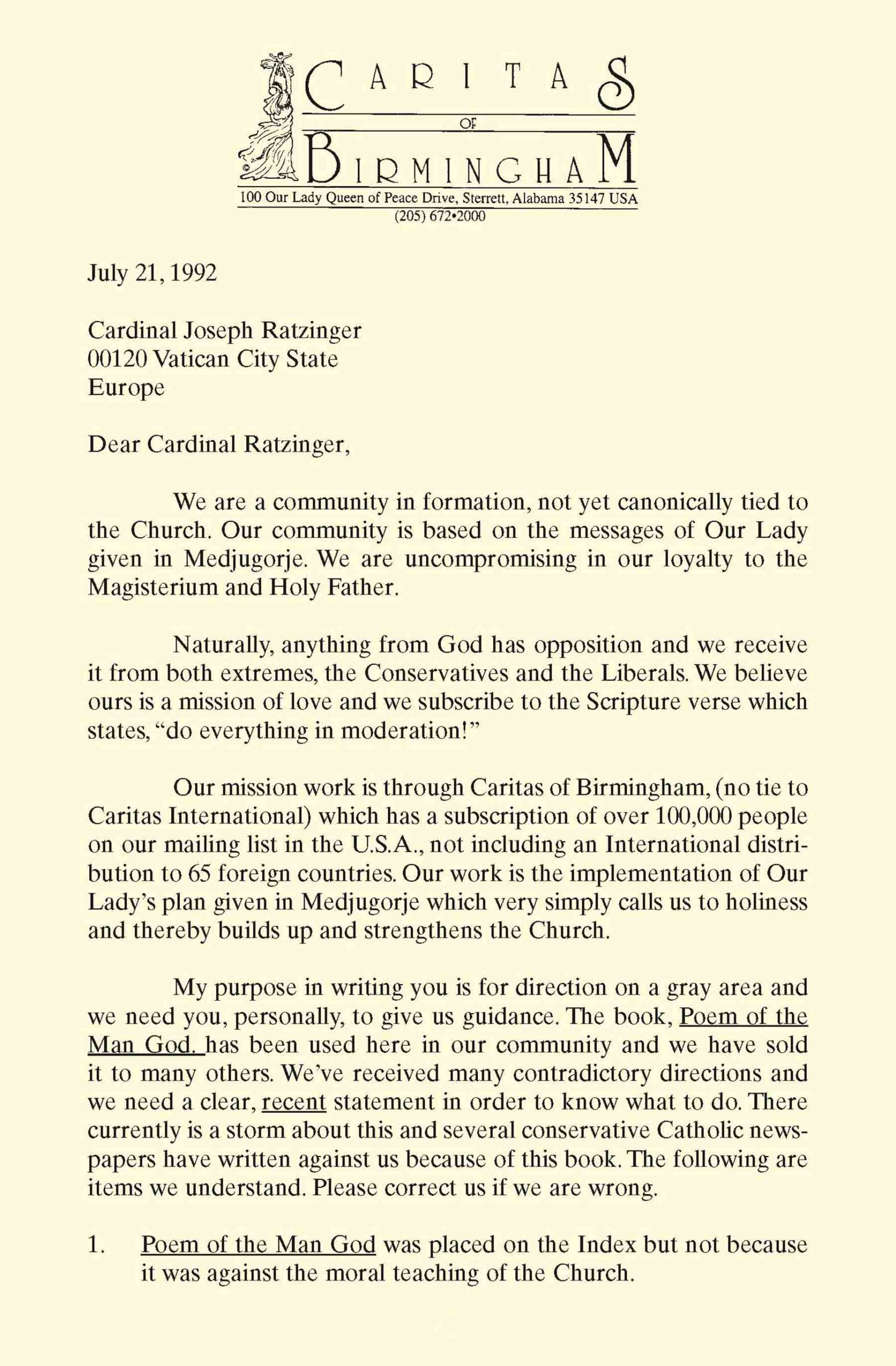
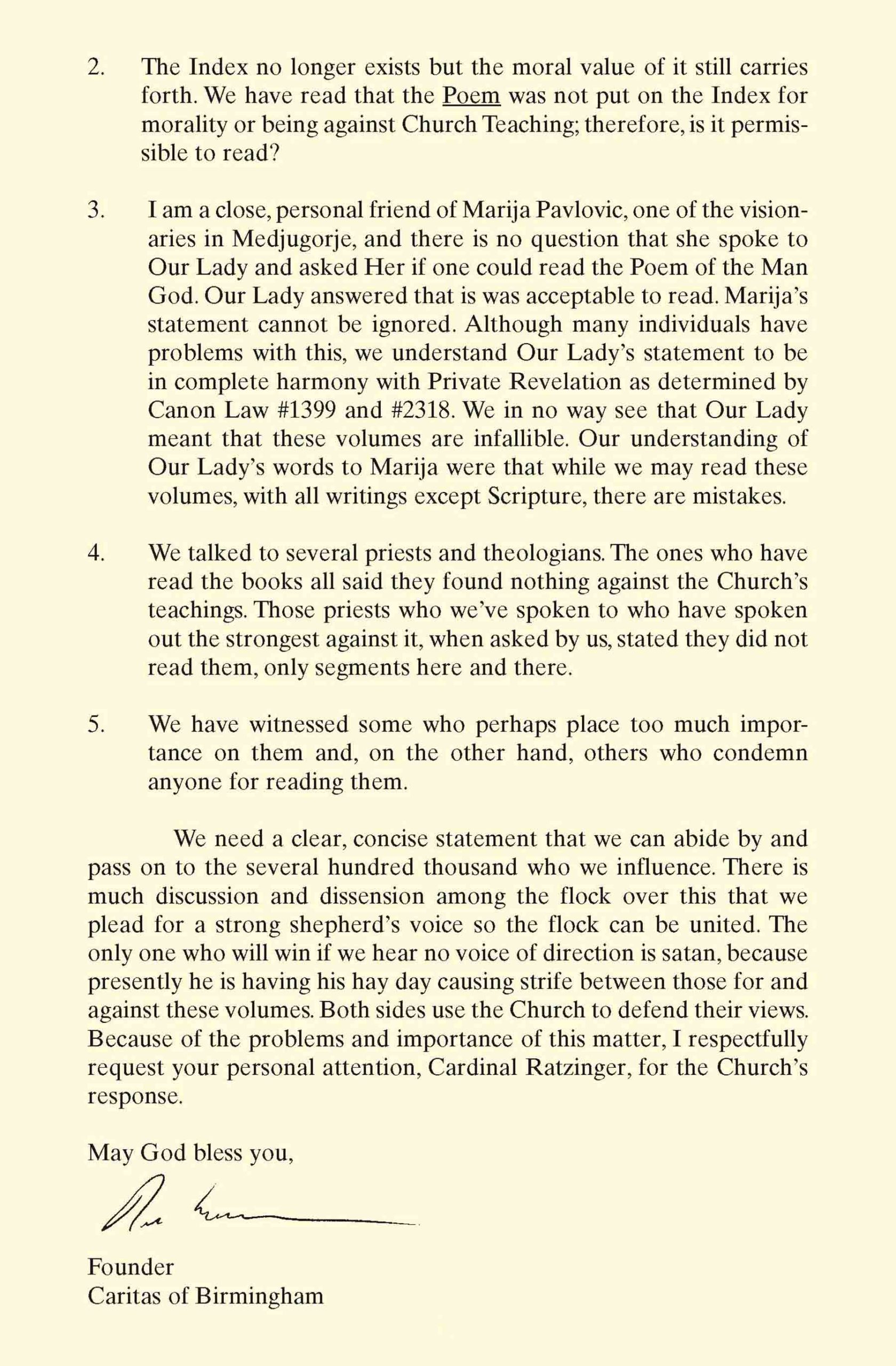
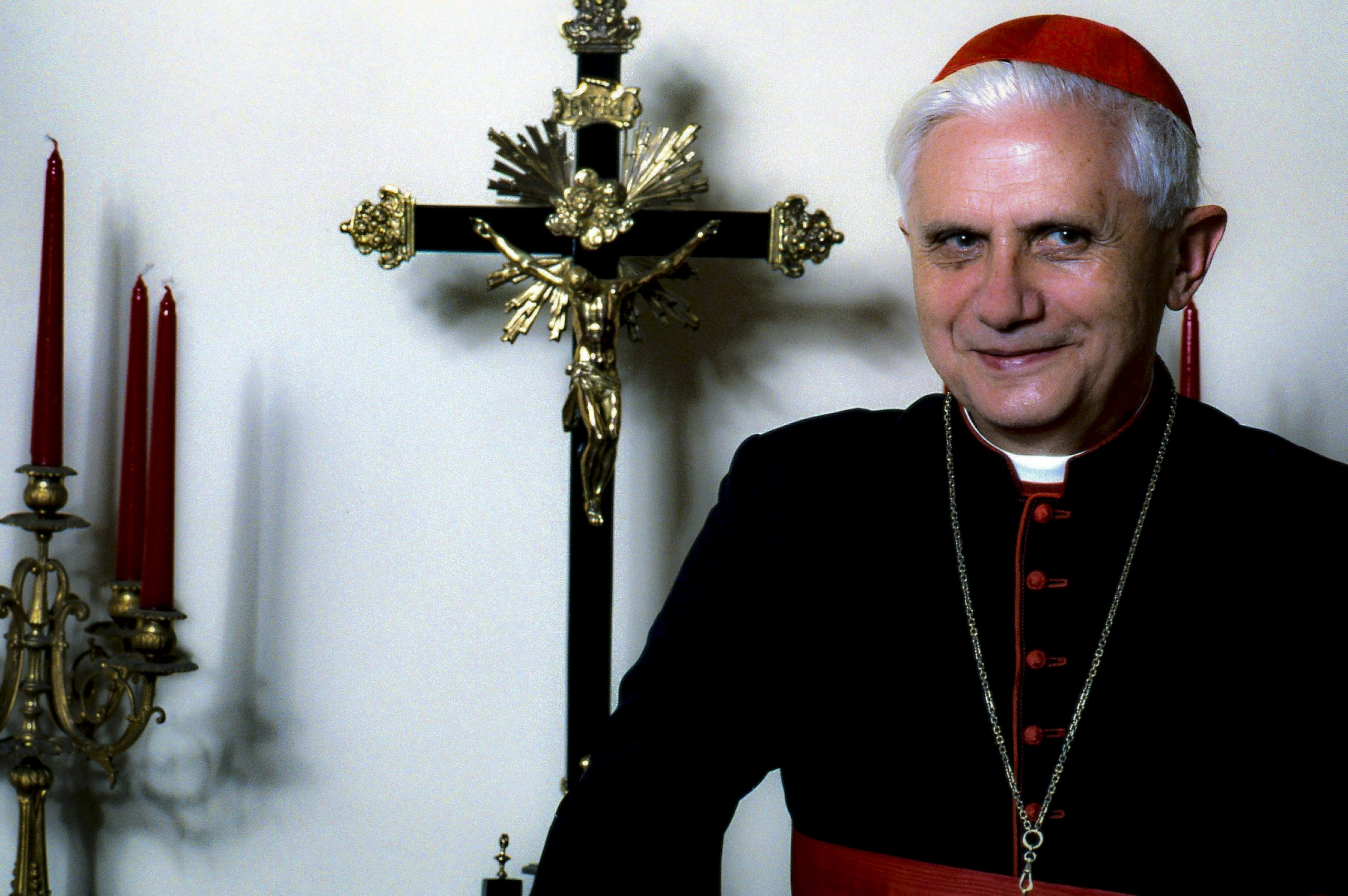
Cardinal Joseph Ratzinger. During many of a Friend of Medjugorje’s trips to Rome, he would sometimes cross paths with and greet Cardinal Ratzinger in St. Peter’s Square as he walked to his office
He was not asking for the Church to make a decision on the words of Maria Valtorta at that time, but rather, simply asking if Catholics could continue to read these books. Many who were associated with Medjugorje became furious when they learned of the letter, and these Medjugorje people leveled aggressive, public attacks against a Friend of Medjugorje, founder of Caritas, stating that he was putting the apparitions of Medjugorje in jeopardy if Rome reasserted a condemnation of the books, and he would therefore have been condemning Medjugorje. Hence an attack mounted against a Friend of Medjugorje. However, it was clear to him – either the apparitions are true or false. If they are true, and if Our Lady said you must read the books, then there was nothing to worry about. He identified his detractors as atheist in their beliefs in Medjugorje. He believed one should not be concerned that The Poem of the Man-God had been put on the Church Index of Forbidden Books, meaning, at one point, they were condemned. A Friend of Medjugorje put his reputation on the line because Our Lady had given the message, “One must read them,” yet the Church Index of Forbidden Books, which ceased to exist in 1966, said you could not.
The request to Cardinal Ratzinger was not sent with the purpose of confirming his own belief, for Our Lady had already settled the matter in his heart, but rather so that others would have peace about the matter with a recent and clear directive from the Vatican, and thereby satan would not be able to discredit the apparitions in this way. As protocol, when the Church is giving an important ruling in Church history, Cardinal Ratzinger did not respond immediately. His reply to the letter came 10 months later in May 1993, through a Friend of Medjugorje’s bishop, Bishop Raymond Boland of the Birmingham, Alabama Diocese. Rather than forwarding Cardinal Ratzinger’s letter to a Friend of Medjugorje, Bishop Boland sent a letter to him explaining Cardinal Ratzinger’s letter.
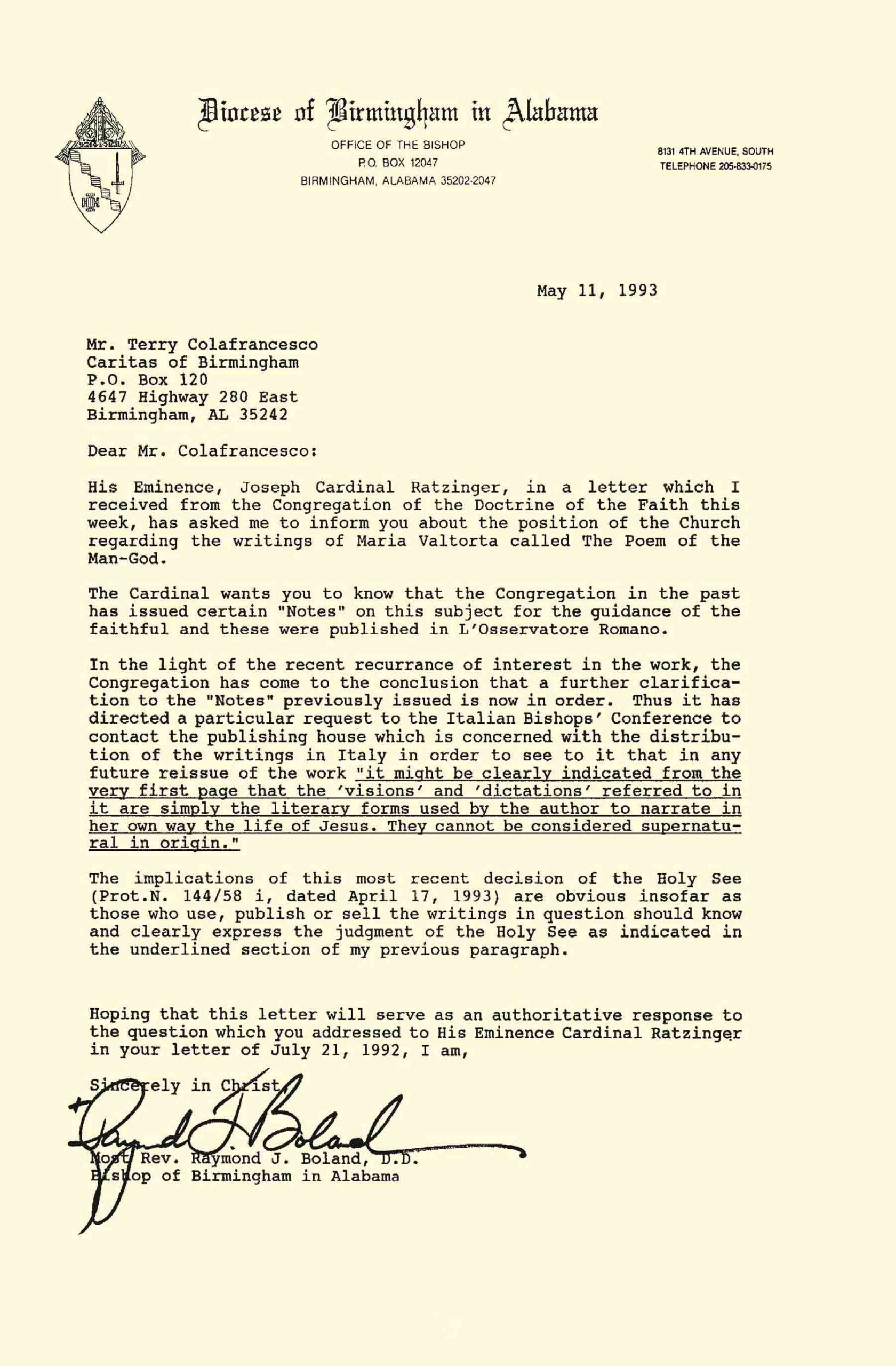
A Friend of Medjugorje’s letter is part of Church history and opened up for the whole world the freedom to read The Poem of the Man-God. Bishop Boland then instructed a Friend of Medjugorje to place the following statement in whatever literature about The Poem of the Man-God Caritas distributed going forward.The ‘visions’ and ‘dictations’ referred to in the work, The Poem of the Man-God, are simply the literary forms used by the author to narrate in her own way the life of Jesus. They cannot be considered supernatural in origin.
After Bishop Boland spoke with Cardinal Ratzinger, Bishop Boland told a Friend of Medjugorje that Cardinal Ratzinger sent his letter to the Holy See (Pope John Paul II), who then sent it to the Italian Bishop’s Conference, who gave the ruling, sending it back to the Holy See, back to Cardinal Ratzinger, who sent the letter back to Bishop Boland to contact Caritas’ founder. With this letter from Cardinal Ratzinger, the matter was settled, as the response clearly stated that people can read, publish, and distribute the book as long as the requirement noted was adhered to. The judgment from the Holy See through Cardinal Ratzinger and the Italian Bishop’s Conference remains in force today as the most recent judgment of the Church on The Poem of the Man-God.God is simple. Our Lady is simple. And the case of The Poem of the Man-God is very simple as well. If you claim belief in the apparitions of Medjugorje, then you must believe what Our Lady has said. Otherwise, as a Friend of Medjugorje says, you are an atheist in regards to the apparitions of Medjugorje. You are not a true believer. A true believer in Our Lady’s apparitions can reason the following. 1. I believe in Medjugorje.
2. Our Lady of Medjugorje said one must read The Poem of the Man-God.
3. Therefore I believe Our Lady and have no reservations about reading and promoting The Poem of the Man-God.
4. And lastly, how could Maria Valtorta be buried inside the Basilica of the Most Holy Annunciation in Florence, Italy, if her writings are condemned?
When viewed in this manner, the case for The Poem of the Man-God becomes easily discernable. Though some feared Caritas’ founder was putting Medjugorje on the line by pressing the Vatican to re-visit the decision made on The Poem of the Man-God, in reality, he broke open for the world, The Poem of the Man-God being freed to be read.
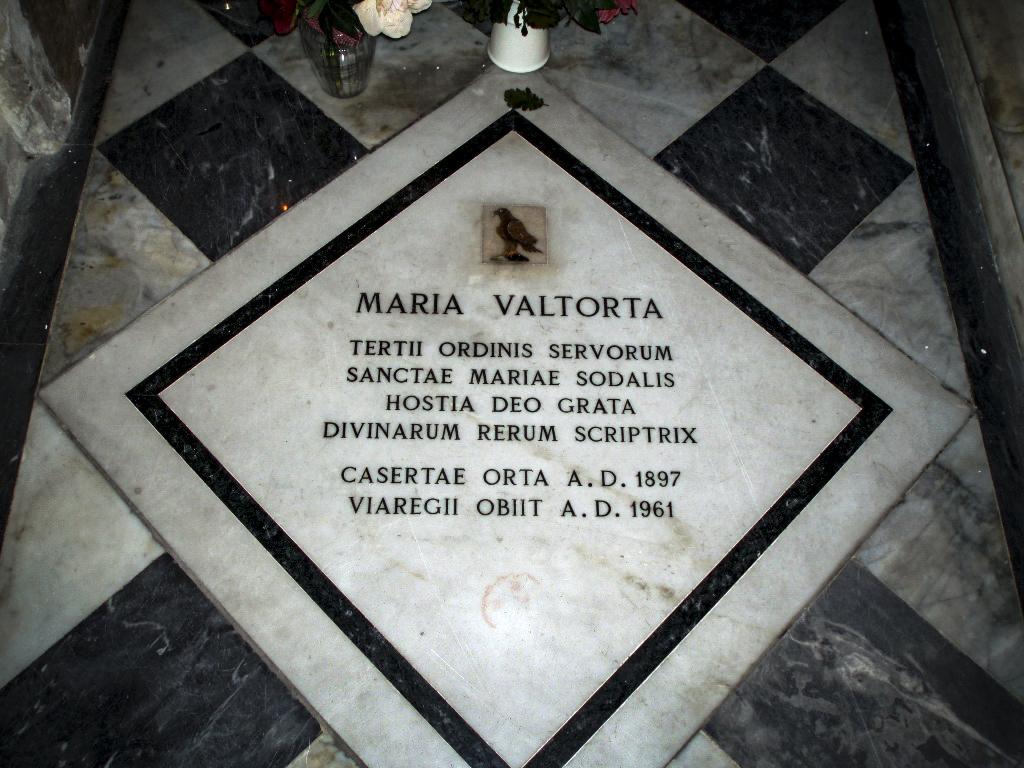
The tomb of Maria Valtorta in the Basilica of the Most Holy Annunciation in Florence, Italy.
For those who want to gain a greater understanding of the history of the controversy over the books, both for one’s personal understanding as well as being able to help dispel the doubts of others who have turned away from these invaluable books that are essential to a deeper living of Our Lady’s messages, Caritas offers a brief history here below.Maria Valtorta wrote the books between the years 1944 and 1947. In 1946, Archbishop Alfonso Carinci, Secretary of the Congregation of the Sacred Rites, was the first Vatican official to deliver a public statement about the works. He reviewed manuscripts of the writings and stated, “There is nothing therein which is contrary to the Gospel. Rather, this work, a good complement to the Gospel, contributes towards a better understanding of its meaning.” In 1948, Fr. Corrado Berti, O.S.M., who served as Valtorta’s spiritual director and submitted typed manuscripts of her work, obtained a special audience with Pope Pius XII for himself and two other priests. Pope Pius XII told Fr. Berti to print the books, stating, “Publish this work as is; he who reads will understand. One hears talk of so many visions and revelations. I do not say that all are true; but some of them could be true.” When asked if the words “visions” and “dictations” should be taken out of the text before publishing, the Pope answered that nothing should be removed. In 1959, Pope John XXIII placed the first edition of The Poem of the Man-God on the Index of Forbidden Books. An explanatory letter that accompanied the decision cited the main reason for inclusion on the list being lack of an Imprimatur as required by Canon 1385. It is important to note here, that many other works that are now accepted by the Church were also included on this list, the most notable for our day being St. Faustina’s Diary, through which the whole Church now celebrates Divine Mercy Sunday. Pope Paul VI succeeded Pope John XXIII in 1963, and he abrogated (to abolish by formal or official means) the Index of Forbidden Books in 1966. In June of 1966 Cardinal Alfredo Ottaviani issued a letter stating, “the Index retains its moral force, inasmuch as it warns the Christian conscience to be on guard, as the natural law itself requires, against those writings which can endanger the faith or good morals.”
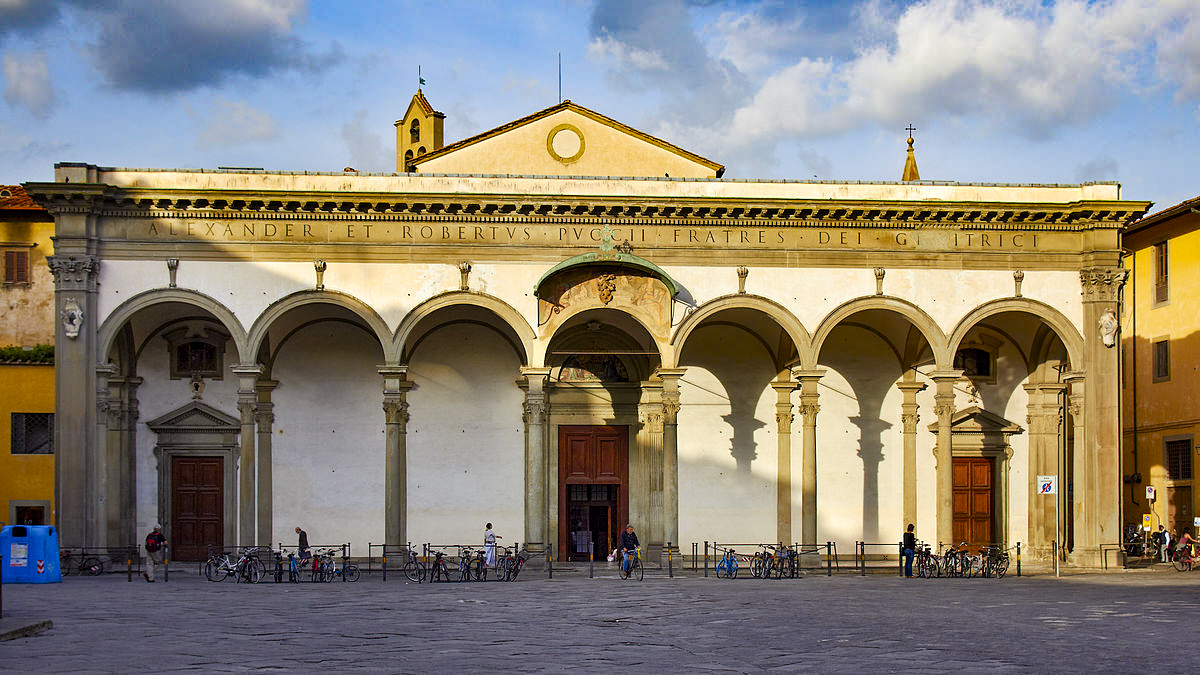
The Basilica of the Most Holy Annunciation in Florence, Italy, where Maria Valtorta’s mortal remains were transferred in 1973. Her tomb is still venerated there today.
The retention of the list’s moral force has been something that opponents to The Poem of the Man-God have clung tightly to, yet Cardinal Ottaviani clarifies the meaning and extent of the retention of moral force very plainly. In reading the above statement, it is clear, Cardinal Ottaviani is not saying that all the books on the list at the time of abrogation should still be considered forbidden, but rather that the understanding of the list’s previous existence is a reminder to Christians that they should naturally beware of reading any past or future material that could endanger their faith or morals. Read his words several times if it is not clear to you, and it will become clear.In 1994, Pope John Paul II initiated the beatification process for an open supporter of The Poem of the Man-God, Fr. Gabriel Allegra. In 2002, the decree of Fr. Gabriel’s beatification was officially proclaimed. Fr. Gabriel had this to say about The Poem of the Man-God:
“I assure you that The Poem of the Man-God immensely surpasses any descriptions — I do not say of mine, because I do not know how to write — but of any other writer … I hold that the Work demands a supernatural origin. …I find in her doctrine: and doctrine such as is sure; it embraces almost all fields of revelation. …Gifts of nature and mystical gifts harmoniously joined together explain this masterpiece of Italian religious literature, and perhaps I should say this masterpiece of literature of the Christian world.”
Also in 2002, the Titular Bishop of Nyssa, Bishop Roman Danylak, issued a written Nihil Obstat, Imprimatur for The Poem of the Man-God.
Some other additional information that supports The Poem of the Man-God follows:
- What the Medjugorje visionaries have said:
Marija (Pavlovic) Lunetti: “Our Lady says The Poem of the Man-God is the truth.” 6
Vicka Ivankovic – “Our Lady said if a person wants to know Jesus he should read The Poem of the Man-God by Maria Valtorta. That book is the truth.”7
- The character of Maria Valtorta:
Accounts of Valtorta’s life, especially during the period of authoring The Poem of the Man-God, indicate she led a devout life and fruitfully endured the sufferings of her physical condition in a Christ-like manner. As already mentioned, Maria Valtorta is buried inside the Basilica of the Most Holy Annunciation in the city of Florence, Italy. If the books are condemned, how could she be buried in a Catholic Basilica?
- The writings themselves:
Nothing has ever been set forth officially by the Church that the writings contain anything that contravenes the teachings of the Church or faith and morals. In addition, the writings exhibit an accuracy, clarity, and understanding of things theological, spiritual, and scientific, that given her state in life and physical location, Maria Valtorta would not have known or understood without the existence of supernatural aid.
The devil Hates The Poem of the Man-God
There is a substantial amount of additional “detail” out there about the history of the controversy surrounding The Poem of the Man-God for the one who desires to delve even further into these details. It may be of benefit or personal interest to some readers to do additional research. If you go further into these details, as you may have gotten a taste from the brief history above, you will quickly find the controversy is so full of a multiplicity of words, arguments, debates, points and counterpoints, a volume of complications that keep people arguing about this or that. satan is the author of division and wants this division to continue. Our Lady said on February 14, 1982:“… Do not argue. satan exists! He seeks only to destroy…”
God, on the other hand, is simple. He told us Who He is in just two words – “I AM.” Our Lady does the same. Who is God? “God is love!…” Our Lady Queen of Peace, Medjugorje, March 2, 2006.The Poem of the Man-God – the Church allows it…Our Lady said it…you can read it. NO ONE can tell you that you cannot!
Medjugorje.com Caritas of Birmingham Operated by the Community of CaritasFootnotes:
1. A Friend of Medjugorje confirmed very clearly on several occasions with visionary Marija (Pavlovic) Lunetti, that according to Our Lady it was acceptable for people to read The Poem of the Man-God. For years, the only information he was able to obtain about the message Our Lady gave in response to the seminarian was that Her response was, “Yes. It makes for good reading.” In 2011, however, discussing this message with one who was part of the prayer group with Marija, it was revealed that Our Lady’s actual response was much, much stronger. The actual response from Our Lady, as related to him by the one who joined Marija’s prayer group frequently in the early days, was, “One must read them.” A Friend of Medjugorje’s work with Our Lady’s messages has been one of an ongoing effort to ensure that the purest translation of Our Lady’s messages are preserved, according to the demand of Our Lady Herself,
June 9, 1984, Eve of Pentecost:
“…you need the Spirit of Truth to be able to convey the messages just the way they are, neither adding anything to them, nor taking anything whatsoever away from them, but just the way I said them…”
Through a Friend of Medjugorje, the mission of Caritas has been the biggest promoter of The Poem of the Man-God in the United States for more than 24 years as of August 2017, a track record that long precedes the discovery in 2011 of what Our Lady truly said about the books. To ignore the proper translation would be a betrayal of Our Lady and Her words. He again chose to be true to Our Lady, and thereby charitable to all who will read these messages now and in the future, instead of choosing the comfort of the “status quo.”
2. Bollettino Valtortiano: No. 31, Jan-June 1985, p. 122.
3. Bollettino Valtortiano: No. 6, September 1972, pp. 21-24.
4. Bollettino Valtortiano: No. 29, Jan-June 1984, pp. 114-116.
5. Ibid.
6. Fr. René Laurentin, Dernieres nouvelles de Medjugorje, number 15, OEIL, 1996, p. 19.
7. Interview with Janice Connell, Queen of Peace Newsletter 1988, volume 1, number 2.

1 Response to "Poem of the Man God"
[…] Poem of the Man God […]